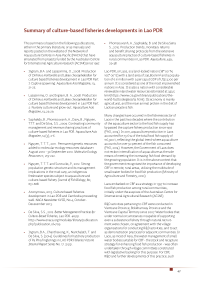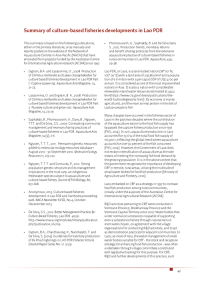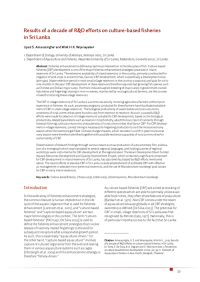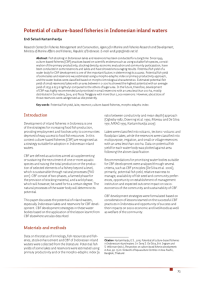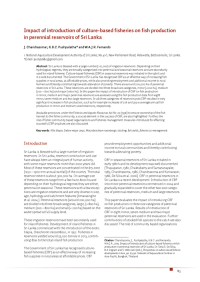A summary of culture-based fisheries developments in Lao PDR based on publications, either in the primary literature, or as manuals and reports posted on the website of the Network of Aquaculture Centres in Asia-Pacific, that have originated from projects funded by the Australian Centre for International Agriculture research (ACIAR) since 1997.
The application of culture-based fisheries in Cambodian waters commenced with a project in sixteen small reservoirs located in four provinces. Initial consultations with the village communities responsible for the water regime management were held and their agreement obtained for monitoring and cooperating through the trial period. One common feature in all the reservoirs selected is the provision of a “conservation zone”, generally in the deeper areas of the water body, where fishing is prohibited.
Culture-based fisheries in village reservoirs of Sri Lanka is a communal activity involving agricultural farmers without prior experience in fisheries. Awareness programs have facilitated establishment of CBF in small village reservoirs. Dissemination of research findings through means such as production of a documentary film, publication of a monograph which was translated to several regional languages, and holding a series of regional workshops were instrumental for CBF development at the regional level.
Fish stocking in Indonesian lakes and reservoirs has been conducted for a long time. Since 1999, culture-based fisheries (CBF) practices based on scientific evidence such as using suitable fish species, consideration of the primary productivity, stocking density, economic evaluation and community participation, have been conducted in some reservoirs and lakes and have showed encouraging results. CBF is highly recommended and prioritised in small reservoirs with an area less than 200 ha.
Sri Lanka is blessed with a large number of irrigation reservoirs. Culture-based fisheries (CBF) in seasonal reservoirs was initiated in the 1980’s and the government has recognised CBF as an effective way of increasing fish supplies in rural areas, at affordable prices, while providing employment and income to farmers and thereby contributing towards alleviation of poverty. The role of fisher community based organisations and fisheries management for effecting successful CBF are discussed.
